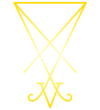Socrates
Master of the Path

The name of Socrates is synonymous with philosophy and the pursuit of truth. Along with Pythagoras, he can rightfully be called the father of philosophy as a whole. Despite every intervention by the enemy over the past two millennia to wipe out all traces of Antiquity, there is perhaps no figure in history who has been so influential across every kind of discipline and school of thought, a testament to the radiance of his character and the abundance of his mind.
YOUTH
He was born in Athens when it was nearing the apex of its power as a state and empire, the primary force of the Mediterranean. Socrates’ family came from the hippeis class of equestrian aristocrats and held significant clout in the city, hence why he was trained in the arts (mousike) as a boy. The traditional story, elaborated from later sources, of his father being a humble stoneworker is allegorical.
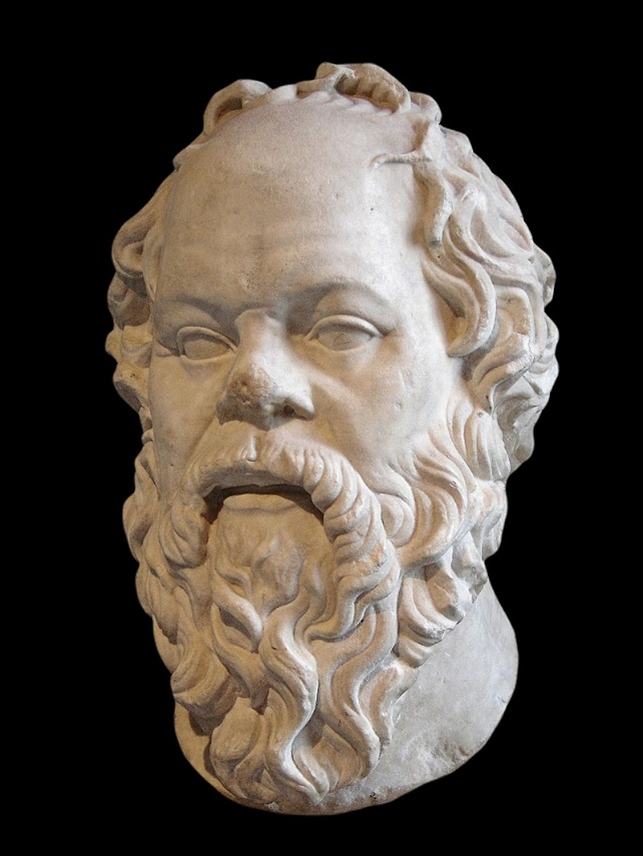
During the latter years of his boyhood, he was known as a prodigy in several areas due to this kind of creative training, an area he returned to much later in life. At this point, the philosophy of Anaxagoras became something of an investigation for him.
As a young man, Socrates participated in the years of military service necessary to acquire citizenship, serving as a hoplite who fought in several battles for the Athenian state. In fact, Socrates was known for his prowess as a warrior well into advanced adulthood, during the Peloponnesian War.
When I was ordered to march along with others to Potidaea and Amphipolis and Delium, where I remained, as any other man would, at my post and ran the risk of death, I acted as I ought and obeyed the command of the city.1
Even at this early point, however, his fellow soldiers remarked on his bravery and moral fortitude, noting how he spurned every customary form of corruption associated with military life. If any phrase could be applied to Socrates, it was death before dishonor.
THE WISEST OF MEN
According to the traditional story, Socrates’ friend Chaerephon went to the Temple of Apollo. The oracle declared that Socrates was the wisest man in Greece, a repetition of what had been said of Myson many years earlier. Socrates, however, felt this couldn’t be true, as he believed he lacked knowledge in many areas of life, particularly concerning human conduct. From that point onward, he devoted himself to acquiring wisdom in the realm of human affairs.
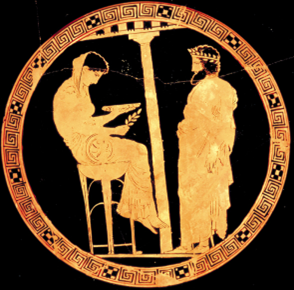
Penetratingly and pointedly, his sole focus became understanding this idea in the context of human behavior, as opposed to deductions about the universe and cosmos formulated by Anaxagoras and other earlier philosophers, which Socrates found lacking. This pursuit of the Path became a kind of design for life to him, he was interested in the why of human behavior and how it aligned with the eternal Good.
Grasping the integral light of his mission, after his thirtieth year, Socrates completed the Eleusinian Mysteries involving the trials of the Great Goddess. The insights he gained about the nature of the soul left an additional, profound imprint on him. His abilities were significantly enhanced, and somewhere around this point, Socrates began to receive insights from the Gods via what he called his “sign” or daimonion. The themes of death and rebirth prevalent in the rite deeply affected how he conducted himself in everyday life. The pursuit of what it meant to follow true moderation, however nebulous it seemed, glittered in his mind.
Although traditionally portrayed as a wandering philosopher without influence, Socrates was in fact somewhat of a power player in Athenian politics. The office he held on the Athenian Boule was equivalent to a senatorial rank, giving his decisions real weight. A highly notable figure, he also gained many followers among the Athenians and from various parts of the world due to the luster and beauty his name carried, all in spite of the modesty of his lifestyle and the lack of a formal school to teach his ideas.
Socrates sought to impart the basic wisdom of the Gods to Athenian society by encouraging something he believed was closer to godliness. What he was concerned with was forging the quickest path to becoming an upstanding soul. This calling, he held in contrast to the appetites of ordinary Athenians, those obsessed with the leveling spirit of democracy, superstitions about the Gods, material excess, cruelty toward Athens’ enemies, and general wantonness.
Revealingly, he was known to wander the Great Agora of Athens, approaching the powerful as they bought luxuries and asking questions like, "Is that what you need?"
Having deep reservations about the character of Athenian society and its direction, he remained aloof from the intrigues of the wealthy and powerful in government. At the time Socrates began to gain fame, Athens was entrenching its power and prestige in all areas under the leadership of Pericles; the so-called Age of Pericles. Although Socrates held Pericles in some esteem, he was unmoved by the spirit of the era. In one of his dialogues, Critias, he expresses doubt about how politicians such as Pericles gained power, viewing rhetorical speakers and demagogues as possessing a partially illegitimate vocation based on deception.
Around this same time, following the deaths of legendary philosophers like Protagoras and Anaxagoras, a new wave of thinkers known as “Sophists” proliferated in Athens. Some were charlatans, charging extortionate fees for basic insights. Others used rhetorical flourishes and tricks to confuse people, their ideas often misleading. Socrates stood opposed to the less scrupulous of these men, choosing his students based on insight into their true potential, regardless of their origins. It was this incorruptibility that endeared him to many people in Athens and beyond.
SOCRATIC METHOD
The Socratic Method is a form of cooperative argumentative dialogue that uses questioning to stimulate critical thinking and expose underlying assumptions. The method involves a teacher or interlocutor posing a series of guided questions to a respondent, aiming to refine or dismantle their beliefs through reasoned inquiry. Rather than delivering knowledge directly, Socrates would ask probing questions.
Exchange is an important element of the Socratic Method. Socrates insisted in every dialogue that he was intervening as a participant to learn more. In the Charmides dialogue, for instance, he discusses the notion of sophrosyne, a divine quality associated with tempering one’s mind and actions. In this dialogue, which he holds with Critias and the youth in Athens most known to him for embodying all the qualities of sophrosyne, he explores several scenarios and definitions of the term before coming to an impasse and admitting he has no idea what sophrosyne actually is.
In another dialogue, the Ion, Socrates confronts a rhapsode (one of the performers of epic poetry in Athens) named Ion of Ephesus, who claims to have insight into Homer’s writings but cannot rationally explain why he is able to do so convincingly, as he has no experience of the subject matter of the Iliad. Through relentless questioning, Socrates suggests that there is nothing particularly rational about Ion's gift in this area and that such creativity is a matter of channeling the divine.
The dialectical process of such dialogues often leads to aporia, a state of puzzlement or realization of ignorance, which Socrates considered the beginning of genuine philosophical insight.
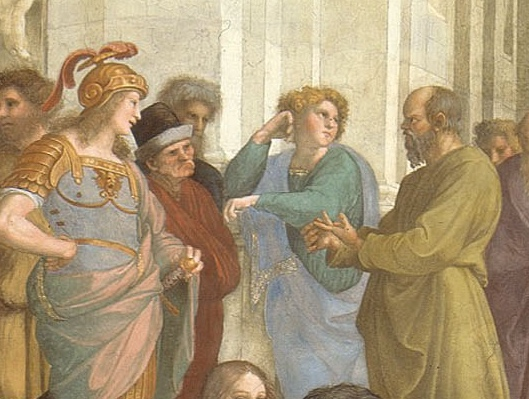
Socrates had certain disagreements with his own associates, such as Aristippus, who viewed self-mastery in the face of luxury as a superior path. These philosophical differences between Socrates and those inspired by him demonstrate the limitless paths in approaching the Gods, standing in contrast to the sectarian conflicts over theological nitpicking and moral scruples culminating in mass murder that would later characterize the Christian period.
These dialogues also involve certain levels of mystery and statements that can be interpreted in deeply intricate ways relating to matters of the universe. Some of these were deliberate contributions of Socrates himself, while others were fashioned by Plato paraphrasing his teacher’s words.
HOSTILITY
The glory days of Athens were indeed short-lived, as the Peloponnesian War instigated by Sparta created a two-decade-long conflict that was disastrous for the Athenian hegemony and led to multiple coups against the democracy. Socrates fought valiantly in the Battles of Potidaea, Delium, and Amphipolis in service to the Athenian state but still refused to endorse the ideology of the democratic system.
The philosopher subsequently garnered a hostile audience during the war due to the relationship of his ideas to certain developments in the waning power of Athens. Alcibiades, one of Socrates’ most prominent associates, had separated from Socratic advice and became a major figure in Athenian politics. Inclined toward profligate tendencies and not particularly loyal, he became a traitor serving Sparta, defected to the Persians, and finally installed himself in a coup in Athens, pursuing further military victories against his former allies.
At the Battle of Notium, this all came undone dramatically, and democracy returned to Athens amid a fulcrum of chaos, but also divested the city of its most capable military commanders associated with the wily Alcibiades. Adding to the accusations, two other disciples, Critias and Charicles, would soon become infamous rulers after parting ways with their teacher.
Accusations therefore continued to follow Socrates. After the victorious Battle of Arginusae, where a number of triremes sank in a storm, the Athenian leadership and the masses wished to put eight generals to death for failing in their duties. Socrates opposed this, calling it an illegal act that would render Athenian hands covered in blood.
Due to the excellent leadership of Lysander of Sparta, Athens suffered a crushing blow at the Battle of Aegospotami. Sparta's allies even threatened to destroy and level the city entirely. However, Sparta simply made Athens into a puppet state and installed a dictatorship now known as the Thirty Tyrants, led informally by Critias. He became one of the most infamous tyrants in Athenian history and brutally executed thousands, acts which Socrates opposed. Due to his vocal resistance, Critias even censored Socrates with a series of absurd laws.
Critias was soon deposed in another orgy of violence. As Athenian democracy was restored, Socrates continued to speak out against the nature of democracy just as virulently as he had against the Thirty Tyrants. Consequently, certain powerful individuals in Athens, such as Anytus, a self-made man and strong proponent of democracy and egalitarianism, began to view Socrates with suspicion.
Others in Athens, having fallen into a secular lifestyle characterized by power plays, felt threatened by Socrates’ insistence on communion with the Gods, his views on what was truly divine, and the city’s obvious brutal decline, which made them anxious about their positions, possessions, and patronage. Furthermore, the apparent relationship of Socratic ideas to Alcibiades’ treachery and Critias’ tyranny seemed to some a viable reason to condemn Socrates.
Among many other factors, this led swiftly to Socrates’ trial via state informants. He was accused of introducing new Gods not legally sanctioned by Athens, corrupting the youth, and subverting institutions. Socrates mounted a valiant defense, acting as his own advocate. When accused of corrupting Critias and Alcibiades into becoming tyrants, Socrates replied that it was Athens itself that had corrupted them.
Although he had powerful allies and could have escaped at any moment, he chose to resign himself to fate to set an example for all generations to come. There was nothing more to learn, to question, or to say.
Surrounded by his beloved followers, he took the poisoned chalice and passed into eternity.
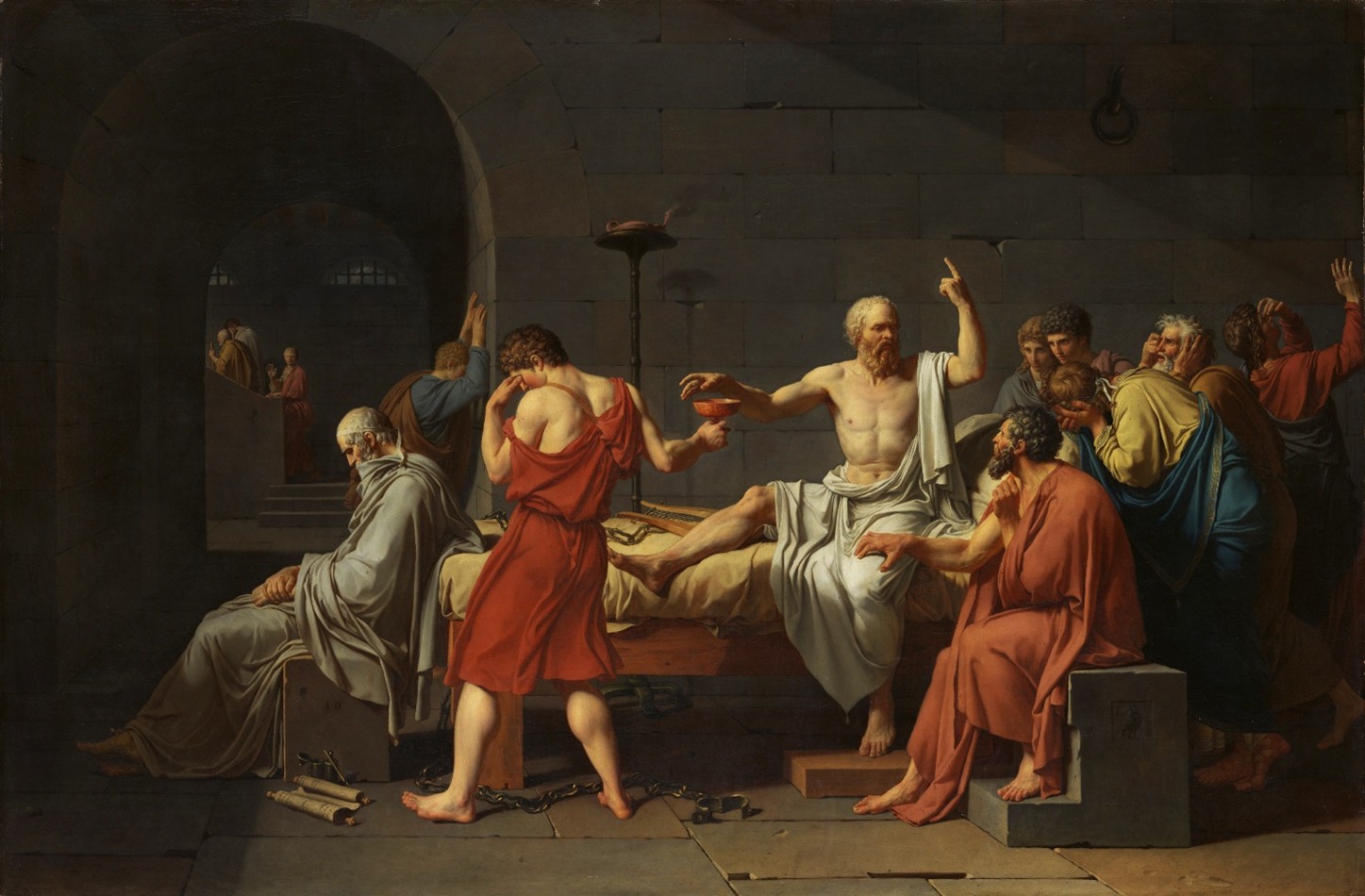
Socrates gained a following in the Hellenistic world following his martyrdom. However, the primary proliferation of his dialogues occurred during Alexander’s conquests and among certain influential Romans who had taken certain rites. It is evident in how Alexander the Great pursued conquest that he adhered rigidly to the ideas of the Republic.
XANTHIPPE
Xanthippe was the wife of Socrates. As with everything the great philosopher embarked on, Xenophon claims Socrates chose her because she was the most difficult, witty, and irascible woman in Athens, known for causing public disputes and dismissing philosophers as idle do-nothings. In the opinion of many, just being with her was an arduous task. She was also strongly independent, with little desire to fulfill a typical role.
Socrates was ambitious, however, and broke from the path of many men who choose ease or luxury in intimate matters. Philosophy for him was incarnated in his interactions with his wife. His commitment to understanding the morality and character of people extended even into the most private sphere, in wedding Xanthippe, with sometimes comic effects:
When Xanthippe first scolded him and then drenched him with water, his rejoinder was, “Did I not say that Xanthippe’s thunder would end in rain?” 2
Another account by Athenaeus involved her smashing a cake that Alcibiades sent to Socrates, and his response was, “Well, now you won’t have any of it either.”
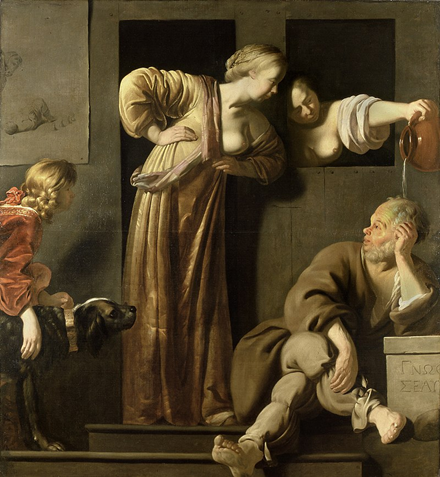
Though scarcely understood by others, Socrates could see the refinement of Xanthippe’s mind and the luster of eternal loyalty behind her unpredictable temperament. Showing their eternal love and care for one another, it was she who remained by his side, lamenting the situation.
His novel approach to women is summarized in this passage:
ἡ δὲ λαμβάνουσα ἅμα τε ὠρχεῖτο καὶ ἀνερρίπτει δονουμένους συντεκμαιρομένη ὅσον ἔδει ῥιπτεῖν ὕψος ὡς ἐν ῥυθμῷ δέχεσθαι αὐτούς.
Καὶ ὁ Σωκράτης εἶπεν· Ἐν πολλοῖς μέν, ὦ ἄνδρες, καὶ ἄλλοις δῆλον καὶ ἐν οἷς δ᾿ ἡ παῖς ποιεῖ ὅτι ἡ γυναικεία φύσις οὐδὲν χείρων τῆς τοῦ ἀνδρὸς οὖσα τυγχάνει, γνώμης δὲ καὶ ἰσχύος δεῖται. ὥστε εἴ τις ὑμῶν γυναῖκα ἔχει, θαρρῶν διδασκέτω ὅ τι βούλοιτ᾿ ἂν αὐτῇ ἐπισταμένῃ χρῆσθαι.
Καὶ ὁ Ἀντισθένης, Πῶς οὖν, ἔφη, ὦ Σώκρατες, οὕτω γιγνώσκων οὐ καὶ σὺ παιδεύεις Ξανθίππην, ἀλλὰ χρῇ γυναικὶ τῶν οὐσῶν, οἶμαι δὲ καὶ τῶν γεγενημένων καὶ τῶν ἐσομένων, χαλεπωτάτῃ;
Ὅτι, ἔφη, ὁρῶ καὶ τοὺς ἱππικοὺς βουλομένους γενέσθαι οὐ τοὺς εὐπειθεστάτους ἀλλὰ τοὺς θυμοειδεῖς ἵππους κτωμένους. νομίζουσι γάρ, ἢν τοὺς τοιούτους δύνωνται κατέχειν, ῥᾳδίως τοῖς γε ἄλλοις ἵπποις χρήσεσθαι. κἀγὼ δὴ βουλόμενος ἀνθρώποις χρῆσθαι καὶ ὁμιλεῖν ταύτην κέκτημαι, εὖ εἰδὼς ὅτι εἰ ταύτην ὑποίσω, ῥᾳδίως τοῖς γε ἄλλοις ἅπασιν ἀνθρώποις συνέσομαι.
Καὶ οὗτος μὲν δὴ ὁ λόγος οὐκ ἀπὸ4 τοῦ σκοποῦ ἔδοξεν εἰρῆσθαι.
She [the girl dancer] took these and, as she danced, kept tossing them whirling into the air, calculating how high to throw them so as to catch them in a regular rhythm.
So Socrates said:
“In many ways, gentlemen, and especially in what the girl is doing, it is clear that the female nature is in no way inferior to the male, what it lacks is judgment and strength. So, if any of you have a wife, let him confidently teach her whatever he wishes her to be skilled at.”
Then Antisthenes said:
“Well then, Socrates, if you think that way, why don’t you educate Xanthippe? Instead, you live with a woman who, I believe, is the most difficult of all women, past, present, or future.”
Socrates replied:
“Because I see that those who want to become skilled horsemen don’t choose the most docile horses, but the spirited and headstrong ones. They believe that if they can handle those, they will easily manage any other horses. In the same way, I wish to deal with people and interact with them, so I have chosen to live with her, knowing full well that if I can endure her, I will find it easy to associate with anyone else.”And this response was thought not to be off the mark.3
She was also the mother of their three sons: Lamprocles, Sophroniscus, and Menexenus. When Alcibiades questioned Socrates about why he tolerated her rages and said he only put up with the crowing of geese because they gave him eggs, Socrates retorted that Xanthippe was the mother who bore his children.
MISAPPROPRIATION
It should come as no shock that Socrates’ life was heavily stolen from and appropriated for the fictional drivel of Jesus Christ, a possibility even medieval scholars acknowledged. This appropriation was a deliberate psychological weapon in late-stage Rome.
The Catholic Church long appropriated Socratic attitudes to push life-denialism, resentment, and complete deprivation, the model of an ideal monastic hermit. Although some Christians, such as Tertullian, held all Greek philosophy to be worthless, various authors claimed Socratic attitudes prefigured Christianity and praised Socrates for profaning pagan beliefs.
When one carefully reads the texts, Socrates advises indulging in food, drink, sex, social matters, and luxury when the body requires it, not in a way that creates endless distractions from the divine. As a model soldier himself, he also outlines in the Republic the purpose of war and violence: to cultivate virtue and a cohesive state.
Socrates never acted as the Nazarene does. Every allusion by him is a question, not a dogma.
Many of these issues in our modern world have simply been flipped on their head. In contrast to the aggressive and bellicose attitudes of Athenians puffed up with power, Westerners have embraced a path of zero conflict, self-annihilation, and worship of weakness since the advent of Christianity. Critics of Western society, such as Nietzsche, therefore aimed a certain amount of venom at Socrates, based on a misperception of him as an idol of life-denialism, especially in the Victorian contex.
BIBLIOGRAPHY
1Crito, 52b
2Lives of the Eminent Philosophers, Diogenes Laertius
3Xenophon, Symposium
Ion
Charmides (Platonic dialogues)
Memorabilia, Xenophon
CREDIT:
[TG] Karnonnos

 አማርኛ
አማርኛ العربية
العربية বাংলা
বাংলা Български
Български 中文
中文 Čeština
Čeština Dansk
Dansk Deutsch
Deutsch Eesti
Eesti Ελληνικά
Ελληνικά Español
Español Français
Français हिन्दी
हिन्दी Hrvatski
Hrvatski IsiZulu
IsiZulu Italiano
Italiano 日本語
日本語 Kiswahili
Kiswahili Magyar
Magyar Македонски
Македонски नेपाली
नेपाली Nederlands
Nederlands فارسی
فارسی Polski
Polski Português
Português Română
Română Русский
Русский Slovenščina
Slovenščina Suomi
Suomi Svenska
Svenska Tagalog
Tagalog Türkçe
Türkçe